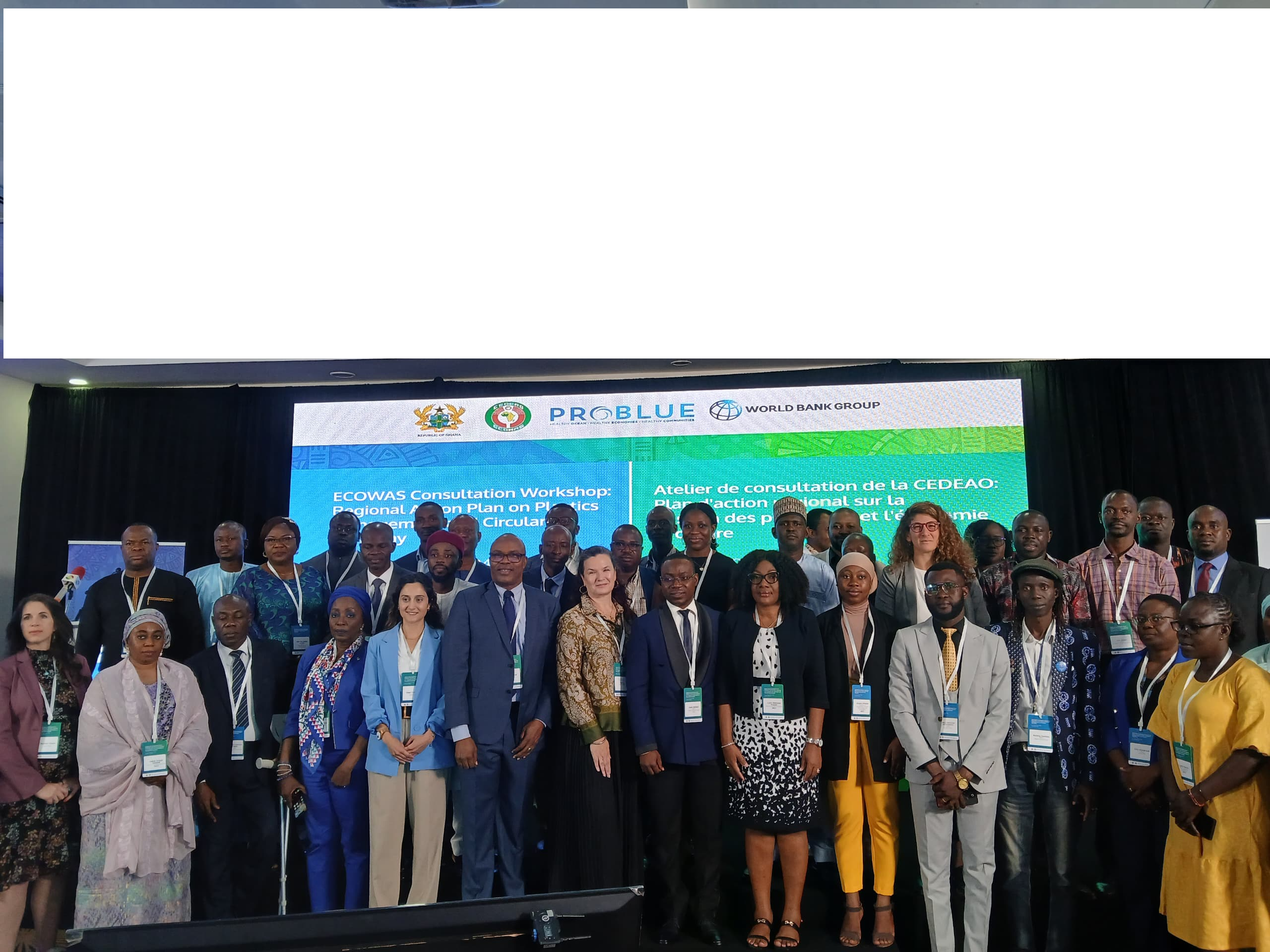
Accra, Ghana//-A two-day consultation workshop is underway in Accra to develop the West Africa Action Plan on Plastics Management and Circular Economy.
The workshop is organised by the ECOWAS Commission in collaboration with the WAEMU Commission and supported by the World Bank and its consulting partners.
The workshop, according to them, is a critical step in addressing both the challenges and opportunities in plastics waste management and transitioning towards a circular economy within the West African region.
“Beyond country-level efforts, the World Bank supports harmonised regional solutions to combat plastic pollution at scale. With the upcoming global, legally binding instrument on Plastics Pollution, we are dedicated to supporting ECOWAS in the development of a Regional Action Plan on Plastics Management and Circular Economy”, the World Bank’s Operations Manager for Ghana, Michelle C. Keane, said in her opening address.
“This will ensure West Africa is well prepared to fulfil the requirements of the upcoming Treaty for its common rivers and oceans. Our support includes advocating for crucial policy reforms to create market incentives to value plastics. It also encourages significant capital investments from both the private and public sectors and promotes research and development for upstream investments such as alternative materials to plastic”.
The staggering statistics
Ms Keane revealed that plastic pollution severely impacts West Africa’s economy, lives, and livelihoods, with estimated costs ranging from $10,000 to $33,000 per tonne of plastic waste.
She also disclosed that fisheries and aquaculture, marine tourism, waterfront property, biodiversity, and ecosystems are especially vulnerable, facing estimated social damages of $2,000 to $7,000 per ton of plastic waste.
West African countries, which generate 6.3 million tonnes of plastic waste annually, bear these costs together. This enormous challenge calls for united efforts in plastic management and the circular economy, with active public and private sector participation, Ms Keane said.
Additionally, with an estimated three times growth in waste generation, Sub-Saharan Africa will be a major contributor of marine plastics by 2050, according to the World Bank’s 2018 report.
The statistics are telling. Indeed, as noted by the World Bank in its recent report, although the per capita plastic waste ratio in West Africa is about one-tenth of Organisation for Economic Co-operation and Development (OECD) countries and one-twentieth of the United States, Africa is estimated to be the second-largest source of ocean plastic pollution via rivers, with a share of 7.8% (after Asia) and could become the largest contributor to poorly managed plastic waste globally by 2060.
World Bank’s Commitment
“The World Bank’s commitment to this cause is exemplified by our support to work on plastic management and the circular economy in West Africa. We have supported technical assistance for policy reforms aimed at adequately taxing plastic products and holding producers accountable for the entire life cycle of their items across various countries.
We are also championing initiatives such as establishing standards for recycled Polyethylene terephthalate (PET) in Ghana and Cote d’Ivoire, conducting recycling pilots for fishing nets in Liberia, and designing Extended Producer Responsibility schemes in Nigeria, Ghana, and Sierra Leone”, she told the participants from the 16 ECOWAS-countries.
These initiatives, according to her, promise cleaner oceans along with the potential for creating green jobs. At the grassroots level, we are focused on increasing awareness and involving citizens in waste management, empowering them to take ownership of their environment.
For instance, through the community-based recycling centres to be piloted under our West Africa Coastal Areas Program (WACA) and Greater Accra Resilient and Integrated Development Project (GARID) here in Ghana.
No single-country solution
In a presentation, an Environmental Engineer at the World Bank, Madam Ozgul Caliciouglu, noted that no single-country solution could address the plastics menace’s transboundary problem.
She, for instance, cited one of the top-20 polluting rivers of the world, Cross River, which receives plastic waste through both Cameroon and Nigeria. Yet, West African countries share a common seascape through 3 thousand five hundred kilometres of shoreline. Therefore, pollution originating from one country impacts the others.
ECOWAS Commission
In a speech read for the President of the ECOWAS Commission, Dr Omar Alieu Touray noted that in recent years, ECOWAS member states have taken several measures to combat plastic pollution.
However, the implementation of regulatory texts has seen mixed success, and the concern has been elevated to the supranational level of ECOWAS to propose a solution considering the transboundary impacts of plastic pollution and individual difficulties in addressing it, he said.
“If we want to continue producing, exporting, and using plastics, we must equip ourselves to adhere to the principles of reduction, reuse, and recycling, as well as the circular economy and the application of extended producer responsibility”.
Plastic pollution requires greater commitment and coordinated action. Dr Touray, therefore, encouraged the participants and experts to propose ideas that would guide and define this regional plan so that each actor within their states addresses plastic pollution responsibly and contributes to the pooling of efforts, particularly in terms of recycling infrastructure and laboratory control equipment, to ensure greater effectiveness at both national and regional levels.
Background
So, in December 2023, ECOWAS adopted a regional regulation for the management of plastic products and waste. This regulation permits a category of plastics, notably biodegradable ones, and bans others, including low-density and very thin single-use bags and packaging (less than 60 micrometres), except those used in human health, national security, and scientific research.
Plastic management requires national, regional, and global actions, given the transboundary nature of the resultant pollution. Therefore, to fight plastic pollution internationally, the Fifth United Nations Environment Assembly (UNEA-5) adopted a historic resolution in March 2022 to negotiate, by the end of 2024, a global treaty to combat plastic pollution.
In this same dynamic, ECOWAS, in collaboration with UEMOA, has initiated the process to equip our region with a regional plastic management and circular economy plan whose implementation should mitigate the impact of plastic pollution by promoting sustainable economic practices in our region.
This initiative is supported by the World Bank.


